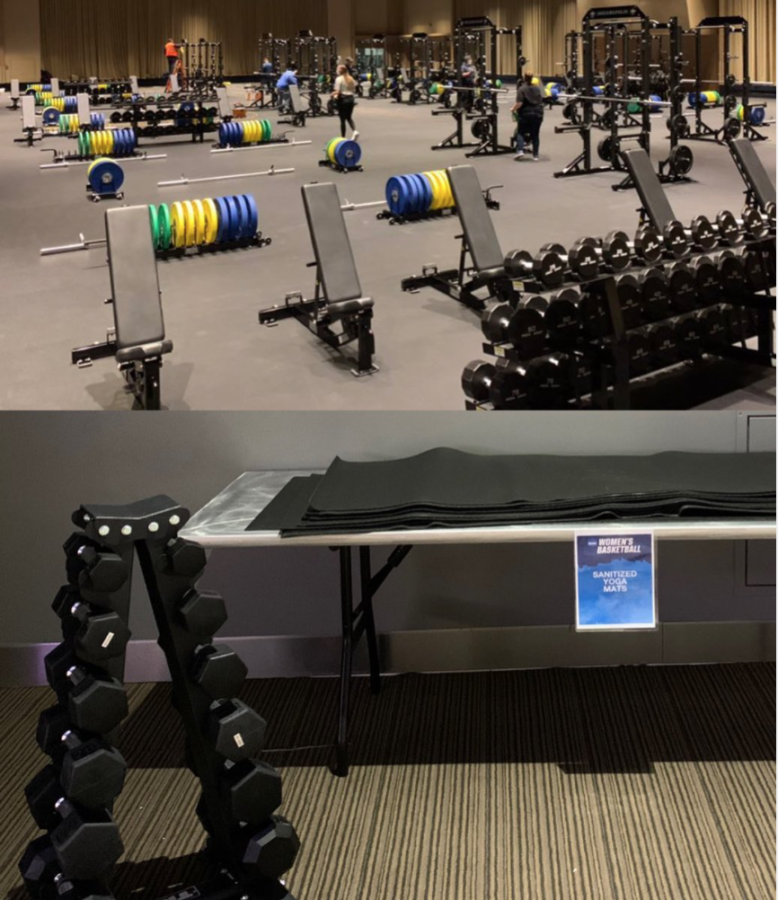Weight Room Controversy Sparks NCAA Gender Equality Conversations
In mid-March, millions of people look forward to watching March Madness, the National Collegiate Athletic Association (NCAA) Division I basketball tournament. Despite COVID-19 this year, the madness continued on for the 80th season, with teams competing in a bubble in San Antonio.
The tournament included women’s and men’s divisions, where Stanford and Baylor respectively emerged victorious, creating joy amongst some and despair amongst others. Yet behind all of this excitement, the NCAA made problematic choices that came to the attention of many athletes and fans.
This gained attention when Sedona Prince of the University of Oregon posted a video that showed differences between the men’s and women’s weight rooms. The men had an entire array of weights, squat racks and benches, whereas the women simply had one rack of dumbbells with a few yoga mats. In her post, Prince says, “If you aren’t upset by this problem, then you are a part of it.”
Ali Kershner, a coach from Stanford University, also posted a picture contrasting the differences, saying, “In a year defined by a fight for equality, this is a chance to have a conversation and get better.”
In response to the unequal weight rooms, Lynn Holzman, the vice president of the women’s NCAA basketball organization, said that the problem was because of limited space, not money. But Prince countered her statement, showing the massive amount of space in the women’s bubble. Later, Dan Gavitt, vice president of NCAA basketball, apologized, admitting that the NCAA “dropped the ball on the weight room issue in San Antonio.” After his statement, the women’s weight room was drastically upgraded.
Both Prince and Kershner were the sparks that raised this issue. Once they did, many players also spoke out, and this revealed other disparities among the men and women.
Both the quality of food and their COVID-19 tests were strikingly different. While the men received a huge buffet, women were given box meals of unappealing food. Additionally, men were receiving polymerase chain reaction (PCR) COVID-19 tests, whereas women had antigen tests, which are less accurate.
As people realized the difference in resources given to men versus women, they began to speak up. Amongst those voices were well-known athletes, including Steph Curry and Billie Jean King. King says, “We’re always supposed to be so happy with just anything, the crumbs, whatever — we’re not happy anymore. We want equity. We want equality. We want the same.”
In general, everyone feels the need for, as King says, “Equal time, equal access, equal facilities, equal treatment. The NCAA must do better.” Discontent with the NCAA’s actions resounded throughout not only professional athletes but also fans. Emelia O’Gilvie (II), who plays basketball and loves watching college basketball, says, “It was really unfortunate that the higher powers in the NCAA didn’t think that all 64 women’s teams deserved the same equipment and benefits that the men did.”
No matter how disappointing this situation is, gender inequality has been going on for a long time. Muffet McGraw, former coach of Notre Dame University women’s basketball, says, “[The fact that] there’s a huge disparity between men’s and women’s sports is hardly breaking news. The NCAA had an opportunity to highlight how sport can be a place where we don’t just talk about equality; we put it on display. To say they dropped the ball would be the understatement of the century.”
McGraw brings up an important point: this is just a small part of a larger problem of inequality in women’s sports worldwide. The NCAA’s weight room disparities are just one of the countless situations where women receive less and face oppression. O’Gilvie says, “[It was] just super upsetting because it was another example of how women’s sports are always seen as inferior to men’s.”
The weight room controversy highlighted the tremendous importance of advocacy and speaking out to fight for equality. Differences like these are unacceptable, but as Kirsten Gillibrand, New York Senator, says, “This is outrageous — but it’s not just about the weight room.” This weight room disparity serves as a part of a larger movement for social change, and this starts with raising our voices.






